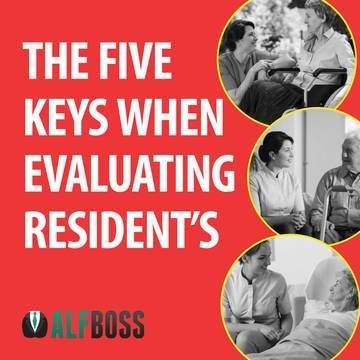
Five Keys to Look for When Evaluating Potential Resident’s
When a prospect is searching for an assisted living facility, they often come with a list of questions for the facility in order to narrow down community options. Many do not know that they must also meet state requirements in order to be approved to move in. In Florida, there are four approved license types that an assisted living facility can have. Each can accommodate different levels of care for a person. With that said, in order to meet the criteria for entry into an assisted living facility the Executive Director or Nurse must evaluate and make sure the potential resident is appropriate prior to moving in. Here are five key things the assisted living facility’s team should look for when assessing a potential new resident.
1- State requirements
As you should know, in the state of Florida, in order to qualify for an assisted living facility or adult family care home, the resident MUST be able to bear weight (stand and pivot), they must be free from communicable diseases, and not have staged wounds (above stage two).
So now that your team has ensured that the prospect has met those three important criteria mentioned above, let’s move on to other important key factors.
Every assisted living facility or adult family care home is different and offers its own unique environment. Although keeping your census up is important, you don’t want to set yourself up for failure.
2- Social Skills
Does this person require a lot of socialization and scheduled activities or are they quiet and reserved? If your community is full of scheduled activities and outings, then you might want to observe if a person is capable of participating or if they want to be involved in activities with other residents. If not, a smaller setting may be a better option for them or you may need to consider having a more one on one activity program to cater to their needs.
3- Memory Impairments
Does this person have a Dementia diagnosis? There are many types of Dementia as well as different stages that go along with the disease. It’s important to ask specific questions about the person’s behavior. For example, does the person sleep at night, have they ever left home and forgotten their way back, and are they aggressive towards others? It’s important to keep your staff and residents safe. If you don’t have a secured environment then a person who has wandered or eloped may not be a good resident for your community. If a person is combative, you don’t want to accept someone who may harm another resident or staff member.
4- Personality
You want a person to be a long term resident. Spend lots of time getting to know the resident upon meeting them. Find out a little history about them so you can provide a quality of life that will make them happy as they age in place. This is particularly important if you plan on offering a shared room or apartment. Your residents must be semi-compatible. You can learn so much from another person’s life experiences!
5- Aging in Place
Is the prospective resident currently having trouble transferring? Do they require a one or two-person assist now or will they in the NEAR future? Start planning ahead for things that can occur based on your assessment. I’ve toured adult family care homes that won’t accept a resident who is incontinent. What happens to the resident when they reach this point?
It is just as important for the assisted living facility to assess your long term care needs as it is for a person to inquire about the community. Aside from the many amazing amenities that senior living facilities offer, care should always be your number one concern when accepting a new resident. Your assessment not only determines appropriateness upon move in but also if you can provide quality care as the resident continues to age.
As a Senior Placement Professional, I personally conduct a high-level care assessment to ensure appropriateness prior to touring families at a particular community. Although the assisted living facility has final approval for any resident prior to moving in, my job is to ensure I have enough information to convey prior to scheduling tours. I also want my family members to choose communities that can not only accommodate care but also their social needs. This is one of the many benefits of working with a local Senior Placement Agency.
North Star Senior Advisors is a placement service helping families in Central Florida. To learn more, contact North Star Senior Advisors today at 407-796-1582 or visit northstarsa.com.